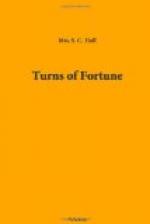Time passed on. The bride wrote a letter, which, in its tone and character, sounded pretty much like a long trumpet-note of exultation. Mrs. Myles declared it to be a dear letter, a charming letter, a most lady-like letter, and yet evidently she was not satisfied therewith. She read scraps of it to all the neighbours, and vaunted Mrs. Ivers, the Honourable Mrs. Ivers, up to the skies. Like all persons whose dignity and station are not the result of inheritance, in the next epistle she was even more anxious to impress her humble relatives with an idea of her consequence. Mingled with a few epithets of love, were a great many eulogiums on her new station. She was too honest to regret, even in seeming, the rural delights of the country, (for Helen could not stoop to deceit,) but she gave a list of titled visitors, and said she would write more at length, were it not that every spare moment was spent in qualifying herself to fill her station so as to do credit to her husband.” This old Mrs. Myles could not understand; she considered Helen fit to be a queen, and said so.
CHAPTER V.
For more than two months, Rose and Edward did not meet again; for more than four after that, he never entered the cottage which had contained what he held most dear on earth; but one evening he called with Mr. Stokes. The good rector might have had his own reasons for bringing the young man to the cottage; but if he had he kept them to himself, the best way of rendering them effective.
After that, Edward often came, sometimes with a book from the rectory, sometimes with a newspaper for Mrs. Myles, sometimes to know if he could do anything for the old lady in the next town, where he was going, sometimes for one thing, sometimes for another, but always with some excuse, which Rose was happy to accept as the true one; satisfied that she could see him, hear him, know that he was there.
It so chanced that, calling one evening (evening calls are suspicious where young people are concerned,) Edward was told that Mrs. Myles had gone over to Lothery, the next post town, and that Miss Rose was out. The servant (ever since Helen’s marriage, Mrs. Myles had thought it due to her dignity to employ such a person) said this with an air of mystery, and Edward inquired which way Miss Rose had walked. Indeed, she did not know.
Edward therefore trusted to chance, and he had not gone very far down a lane leading to the common of Abbeyweld, when he saw her seated under a tree (where heroines are surely found at some period or other of their life’s eventful history) reading a letter. Of course he interrupted her, and then apologised.
“The letter,” said Rose, frankly, “is from poor Helen.”
“Why do you call her poor?” he inquired.
“Because she is very ill; and I am going to her to-morrow morning.”
“Ill!—to-morrow!—so suddenly—so soon!” stammered Edward.




